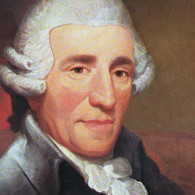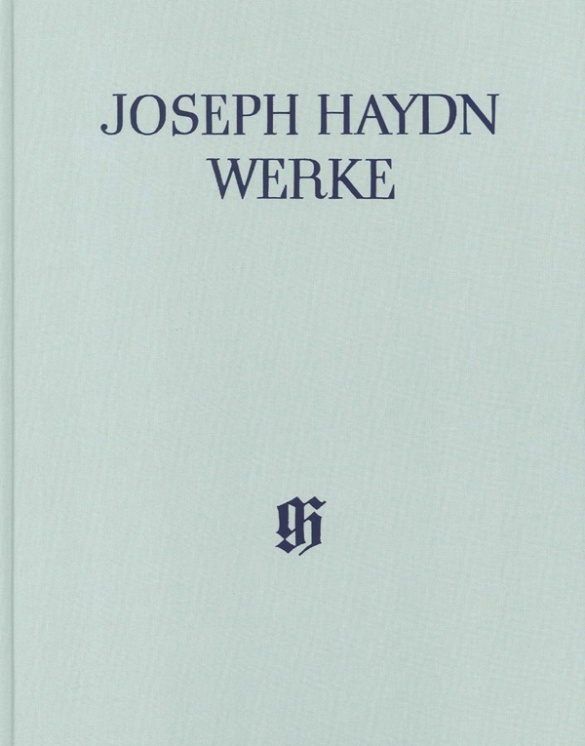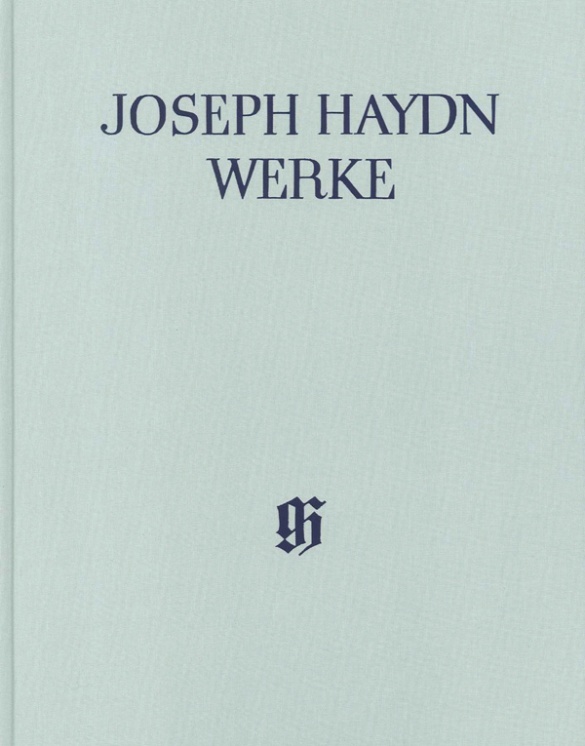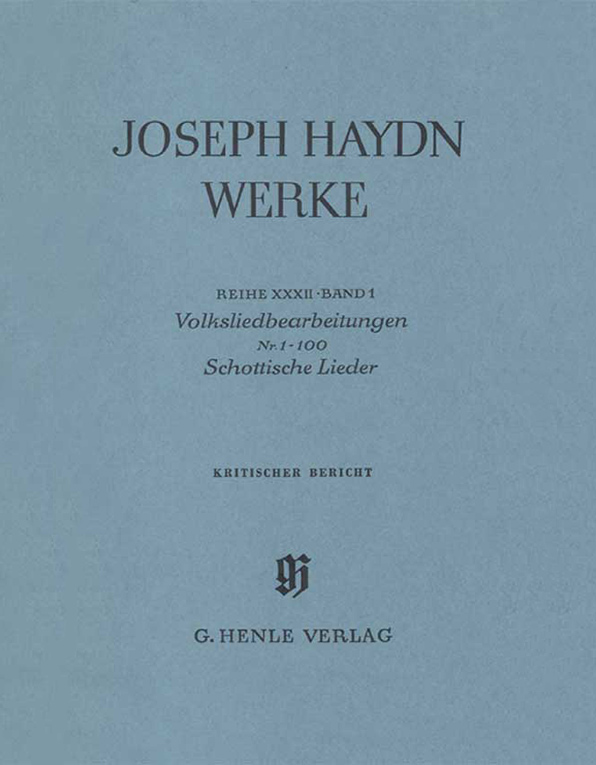Joseph Haydn
Ser. 32, Vol. 4 | Arrangements of Folk Songs no. 269-364 Scottish and Welsh Songs for George Thomson
Content/Details
About the Composer

Joseph Haydn
His immense oeuvre documents the profound changes in music history during the second half of the eighteenth century, leading to the emancipation of instrumental music. His most important genres are the symphony and the string quartet, where he cultivated the technique of motivic-thematic development; he made significant contributions to the instrumental concerto and to piano music; during the last years of his life, he composed his great oratorios. Opera and art song take on a rather subordinate significance.
| 1732 | Born in Rohrau, probably on March 31 (baptized on April 1). |
| 1737 or 1738 | His uncle Johann Mathias Franck takes him in, in order to oversee his musical education. |
| around 1739/40 | For about 8–10 years, chorister at St. Stephen’s Cathedral in Vienna. |
| from 1750 | He makes his living as a musician, teacher, and composer. |
| 1757–61 | Employed as music director by Count Morzin. He makes a name for himself as a composer: fifteen symphonies, piano sonatas, trios, divertimenti, string trios, wind partitas, string quartets Opp. 1 and 2. |
| 1761 | “Times of Day” Symphonies Nos. 6–8: “Le matin,” “Le midi,” “Le soir.” |
| from 1761 | Employed by Prince Paul Anton at the Esterházy court, by Prince Nikolaus from 1762, by Paul Anton II from 1790–96, then by Nikolaus II, first as vice-Kapellmeister, then as Kapellmeister after 1766. |
| 1764–65 | Symphonies No. 22 in E-flat major, “Philosopher”; No. 30 in C major, “Alleluia”; and No. 31 in D major, “Hornsignal.” |
| 1766 | Prince Nikolaus Esterházy demands operas for the theater in his newly erected castle. Haydn’s operas are written primarily for special occasions, e.g., “La Canterina,” for the Kaiser’s visit in 1766. He composes many baryton pieces for Prince Nikolaus. |
| 1766–74 | Eighteen symphonies, including “La passione” in F minor (1768), “Lamentatione” in D minor (1770), “The Schoolmaster” in E-flat major (1774), “Trauer” (“Mourning”) in E minor (1772): expanded expressive range (six are in minor keys), more counterpoint. |
| 1768 | Premiere of “Lo speziale” on Goldoni’s libretto for the inauguration of the new opera house at Eszterháza. |
| 1770 | Premiere of the dramma giocoso “Le pescatrici.” After a ten-year hiatus, he writes the pioneering string quartets “6 Divertimenti” Op. 9, and Op. 17 (1771). |
| 1771 | Piano Sonata No. 20 in C minor. |
| 1772 | “Farewell Symphony” No. 45 in F-sharp minor, “6 Divertimenti (‘Sun Quartets’),” Op. 20, which are characterized by contrapuntal techniques (some have fugues as final movements). |
| 1775 | Premiere of the opera “L’incontro improvviso.” |
| around 1775–78 | “Missa brevis sancti Joannis de Deo (‘Little Organ Mass’).” |
| 1776 | Prince Nikolaus calls for regular opera performances at Eszterháza. Haydn adjusts works imported from Vienna or Italy to the local taste. He moves from Eisenstadt to Castle Eszterháza, where he resides for ten months a year. Little instrumental music after 1776, often with integrated opera music. |
| 1777 | Premiere of “Il mondo della luna,” after Goldoni. |
| 1779 | Contact with the publisher Artaria, who distributes his compositions over the following decade. |
| 1781 | Premiere of the opera “La fedeltà premiata.” Missa Cellensis, “Mariazellermesse”; String Quartets, Op. 33 (‘Russian Quartets’), which are written “in a quite new and special way” (Haydn) after a rather long break in composing quartets and regarded as paradigmatic for Haydn’s “wit” in the sense of his playful engagement with the instruments. |
| 1782 | Premiere of “Orlando paladino.” He begins selling his compositions abroad as well; he has the Symphonies Nos. 76–78 and 79–81 (1783–84) printed in Paris. |
| 1783 | Cello Concerto in D major (Hob. VIIb: 2). |
| 1784 | Premiere of “Armida”; from this point he composes no more operas for the court. Piano Concerto in D major. |
| 1785–86 | Commission by Count d’Ogny to write six symphonies (the Paris Symphonies, Nos. 82–87) to be performed at the Concert de la Loge Olympique in Paris. |
| 1787–90 | String Quartets, Opp. 50, 54, and 55. After Nikolaus’ death, Prince Paul Anton II dismisses the entire court chapel; Haydn retains his office in name only. |
| 1791 | Composition of the opera “L’anima del filosofo ossia Orfeo ed Eurudice,” which never reaches the stage (posthumous performance in Florence in 1951). |
| 1791–92 | Stay in London, engaged by the concert manager Johann Peter Salomon. “6 Quartetti,” Op. 64; the first volume of his transcriptions of Scottish folk songs appears in 1792. Composition of the first six London Symphonies Nos. 93–98, including the Surprise Symphony No. 94. |
| 1792 | Sinfonia Concertante for violin, cello, oboe, bassoon, and orchestra in B-flat major. |
| 1794–95 | Second stay in London. Six London Symphonies Nos. 99–104, No. 104 has monothematic opening movement, “Military” Symphony No. 100 integrates Janissary music; sonata-rondo as a new form of final movement, e.g., in No. 102. |
| 1794 | Accession to power of Nikolaus II, who calls for a mass to celebrate the princess’s name day every year. Six new masses are written: the “Heiligmesse” in B-flat major and the “Kettledrum Mass” in C major (1796), the “Nelson Mass” in D minor/D major (1798), the “Theresienmesse” in B-flat major (1799), the “Creation Mass” in B-flat major (1801), and the “Wind Band Mass” in B-flat major (1802). |
| 1796 | Vocal setting of the initially instrumental version of “The Seven Last Words of Our Saviour on the Cross;” Trumpet Concerto in E-flat major. |
| 1797 | Emperor’s Hymn “Gott erhalte Franz den Kaiser” (“God Save Emperor Francis”) and the Emperor Quartet in C major, Op. 76 No. 3. |
| 1798 | Premiere of his oratorio “The Creation.” |
| 1801 | Performance of oratorio “The Seasons.” |
| 1809 | Dies in Vienna on May 31. |
Product Safety Informations (GPSR)

G. Henle Verlag
Here you can find the information about the manufacturer of the product.G. Henle Verlag e.K.
Forstenrieder Allee 122
81476 München
Germany
info@henle.de
www.henle.com
推荐
autogenerated_cross_selling




